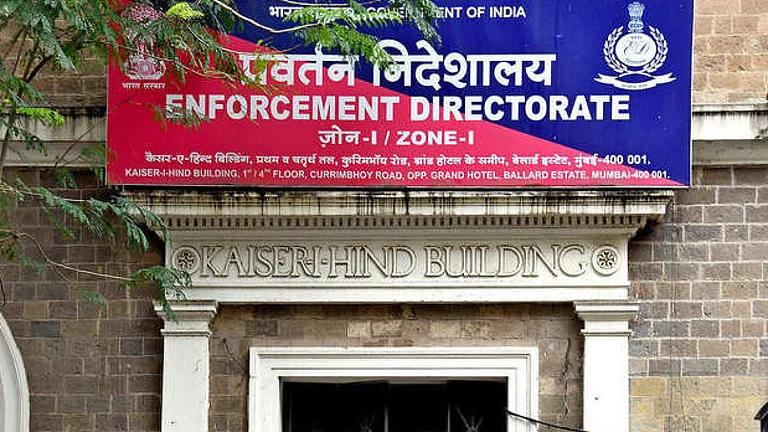The Enforcement Directorate has started tightening the screws on start-ups over alleged violations of foreign direct investment (FDI) norms. The federal agency has sent FEMA notices to various start-ups lately. The most recent platform that came under ED scanner is fintech venture Simpl, a buy-now-pay-later application.
The federal agency has filed a case under the Foreign Exchange Management Act (FEMA) against One Sigma Technologies Pvt Ltd, which operates Simpl app, for alleged contraventions amounting to ₹913.76 crore. Similarly, Flipkart-backed ecommerce platform Myntra (₹1,654 crore), and fintech major Paytm (₹611 crore) have also received FEMA notices.
These incidents have raised questions on compliance practices being followed across Indian start-up ecosystem. However, the ED crackdown marks a shift in regulatory intent and acts as a “red alert” for new-age businesses, especially in fintech sector, which is increasingly facing regulatory heat.
What Simpl, Myntra, Paytm Violated?
The federal agency had received “credible” information about Simpl, which revealed that the fintech got substantial foreign investment from the United States in violation of Indian FDI regulations. It has allegedly received ₹648.87 crore in FDI and additionally raised ₹264.88 crore via convertible noted.
The start-up treated both investments under the 100% automatic route, and it classified its business activity as “Information Technology and computer service activities” to qualify for the automatic FDI route. However, ED found that Simpl’s core business operations fall under the “financial activites” category.
And under FDI rules, start-ups falling under financial services category cannot raise foreign capital through the automatic route; they rather need to government approval for it. To provide context, the automatic route permits foreign investment without prior government approval, but only in designated sectors such as manufacturing, IT, and healthcare.
On the other hand, Myntra allegedly received ₹1,654.35 crore in foreign investments by classifying itself as a “wholesale cash & carry business”, which allows 100% FDI through the automatic route. The rules stated that such entities can sell not more than 25% of their total turnover to group companies.
However, ED claimed that Myntra has sold almost its entire inventory to a related entity, Vector E-Commerce, which in turn retailed the goods directly to consumers and comes under “multi-brand retail business” category. This model is subject to righter FDI limits and requires prior government approval.
The agency, therefore, alleged that Vector was intentionally established to disguise retail (B2C) transactions as wholesale (B2B) dealings on record, allowing it to circumvent FDI regulations governing multi-brand retail branding.
Even Paytm, too, along with its two subsidiaries – Little Internet and Nearbuy - received show cause notices for allegedly violated FDI norms amounting to approximately ₹611 crore. The allegations include that the fintech’s parent company, One97 Communications, failed to inform the Reserve Bank of India about the investment in a Singapore-based entity.
The FDI norm states that any Indian entity making overseas direct investment must report the transaction to the RBI within prescribed timelines. Though founder Vijay Shekhar Sharma clarified that the alleged violations occurred before the acquisition of the two subsidiaries, and the company is now working with regulators to resolve the matter.
Why FEMA Compliance Matters Now?
As regulatory scrutiny intensifies across start-ups, non-compliance with FEMA regulations can bring significant consequences. These include penalties of up to three times the amount involved in the contravention, or ₹2 lakh if the amount is not quantifiable. Additionally, a penalty of ₹5,000 per day can be imposed for continuing contraventions.
The information about how these platforms will be penalised under the FEMA norms, is not out yet. But start-ups can no longer afford to treat FEMA compliance as a "backend formality". Each misstep will now attract legal and financial consequences that could even derail operations, spook investors, and tarnish reputations.
“India wants capital, but on compliant terms. Inconsistent enforcement and evolving rules create uncertainty for investors and founders alike,” says CS Anupriya Saxena, Partner, JMJA & Associates LLP.
While warning start-ups to not to take compliance lightly, she says that the Indian government has tightened its grip on how foreign capital enters and flows through start-ups. “Even historically too, many start-ups – especially in fintech – have operated in regulatory grey zones, using foreign funding without aligning with sectoral FDI rules”.
Some legal expert even called for stricter norms to curb such incidents. “Foreign investors and founders must tighten due diligence and compliance documentation or risk serious legal and financial repercussions,” says Tushar Agarwal, founder and managing partner, CLAP Juris – Advocates & Solicitors.
He adds that the Simpl case and simultaneous action against Myntra mark a new chapter in regulatory enforcement under FEMA. Not only for founders, but it is a wake-up call for investors too who put their money based on representations made by founders that everything is in compliance, when it’s really not, says Akshat Pande, Managing Partner, Alpha Partners.
“Indemnity and contractual protections may not be of any practical help for the investors and directors in such actions under FEMA,” Pande cautions.
They believe that regulatory hygiene is becoming as crucial as growth metrics. Start-ups that once moved ahead with capital-first mindsets, must now shift their focus toward compliance-first governance. The regulators want start-ups to chase growth within the bounds of regulatory compliance.



































